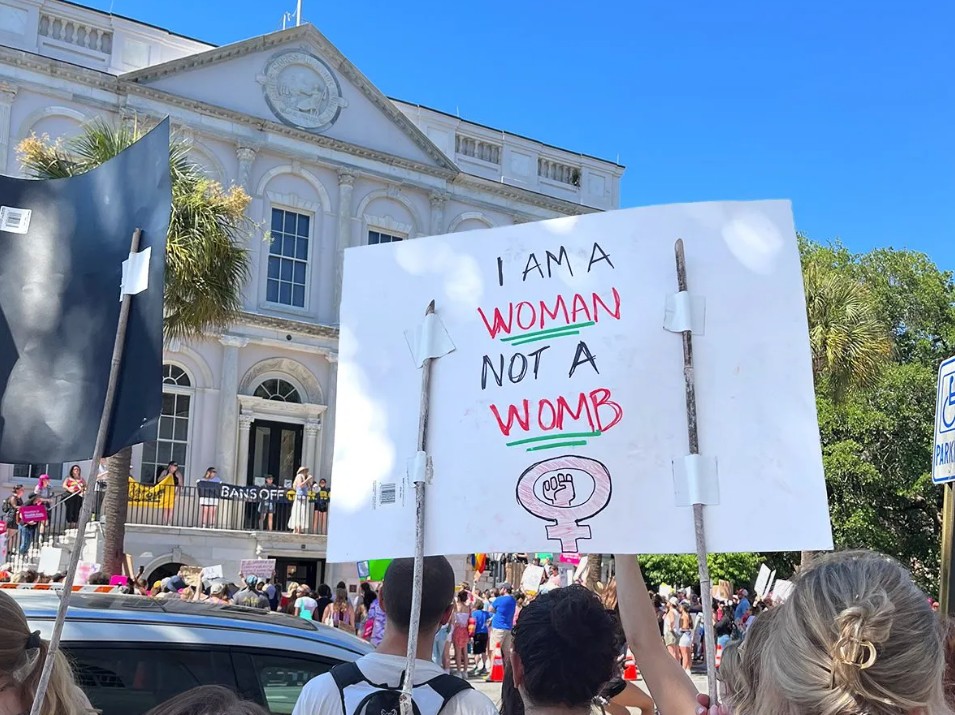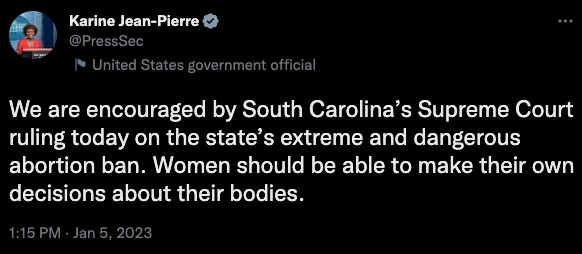
By Samantha Connors | The South Carolina Supreme Court Thursday permanently blocked the state’s six-week abortion ban in a 3-2 vote. The court ruled that the law, sometimes referred to as Senate Bill 1 or the fetal heartbeat ban, violates the right to privacy under the South Carolina Constitution.
“We hold that the decision to terminate a pregnancy rests upon the utmost personal and private considerations imaginable, and implicates a woman’s right to privacy,” Justice Kaye Hearn wrote in the lead opinion. “While this right is not absolute, and must be balanced against the state’s interest in protecting unborn life, this act, which severely limits—and in many instances completely forecloses—abortion, is an unreasonable restriction upon a woman’s right to privacy and is therefore unconstitutional.”
The fetal heartbeat act that was passed in 2021 prohibits women from seeking abortion care after any cardiac activity is detected. This typically occurs around six weeks of pregnancy when many women do not yet know they are pregnant.

In a concurring opinion, Chief Justice Donald Beatty recognized the passions involved in the abortion debate.
“Most commonly, people divide themselves into ‘pro-life’ and ‘pro-choice’ camps,” he wrote. “The decision today is not so limited. Our decision today is neither ‘pro-choice’ nor ‘pro-life’; it merely recognizes that our state constitution grants every South Carolinian a right to privacy, equal protection and due process of laws. This fundamental, constitutional mandate transcends politics and opinion.”
In June 2022, the U.S. Supreme Court overturned the landmark Roe v. Wade abortion protection. In states across the country, including South Carolina, that triggered previously passed legislation to ban abortion. A few weeks after the fetal heartbeat ban went into effect in South Carolina, it was blocked temporarily as the state’s high court considered a lawsuit that it violated the state’s constitutional right to privacy — a right not explicitly enshrouded in the U.S. Constitution.
In Thursday’s South Carolina opinion, Hearn wrote, “The state unquestionably has the authority to limit the right of privacy that protects women from state interference with her decision, but any such limitation must be reasonable and it must be meaningful in that the time frames imposed must afford a woman sufficient time to determine she is pregnant and to take reasonable steps to terminate that pregnancy.
“Six weeks is, quite simply, not a reasonable period of time for these two things to occur, and therefore the act violates our state constitution’s prohibition against unreasonable invasions of privacy.”
Dissenting Justices John Kittredge and George James generally argued that the constitution’s framers didn’t intend for the right of privacy to be applied to abortion.
“There is no language in article I, section 10 of the South Carolina Constitution that supports an interpretation of a privacy right that would encompass a right to abortion,” Kittredge wrote.
State leaders react
Following the court’s ruling, state leaders took to Twitter to share reactions.
Gov. Henry McMaster, who has previously expressed support for a total abortion ban with no exceptions for rape, incest or life-threatening conditions, tweeted: “Our State Supreme Court has found a right in our Constitution which was never intended by the people of South Carolina. With this opinion, the Court has clearly exceeded its authority. The people have spoken through their elected representatives multiple times on this issue. I look forward to working with the General Assembly to correct this error.”
South Carolina Attorney General Alan Wilson, another proponent of strict abortion laws, said, “We respectfully, but strongly, disagree with the Court’s ruling. We’re working with the Governor’s office and legislature to review all our available options moving forward.”
 Not all legislators were upset by the ruling. Sen. Marlon Kimpson, D-Charleston and Dorchester Counties, tweeted, “Victory today for the women of South Carolina!”
Not all legislators were upset by the ruling. Sen. Marlon Kimpson, D-Charleston and Dorchester Counties, tweeted, “Victory today for the women of South Carolina!”
The White House also considered the decision a win. Press secretary Karine Jean-Pierre tweeted, “We are encouraged by South Carolina’s Supreme Court ruling today on the state’s extreme and dangerous abortion ban. Women should be able to make their own decisions about their bodies.”
But S.C. House Speaker Murrell Smith, R-Sumter, echoed conservative sentiments with this tweet: “The U.S. Supreme Court, through their [sic] Dobbs decision this summer, handed the issue of abortion back to state legislatures. Unfortunately, the South Carolina Supreme Court followed the path of the U.S. Supreme Court in Roe v. Wade by creating a constitutional right to an abortion where none exists. Today’s decision fails to respect the concept of separation of powers and strips the people of this state from having a say in a decision that was meant to reflect their voices. Instead, South Carolina is left with a decision that is not reflective of our state’s political process or will.”
Despite arguments that this decision does not reflect voters’ wishes, a November 2022 study from Winthrop University found that 46% of South Carolinians polled believe a woman should have access to abortion care for any reason and 86% supported abortion if in the case of life-threatening pregnancies.
Big win for women’s health advocates
The court’s ruling is a major milestone for the plaintiffs, which include Planned Parenthood South Atlantic and Greenville Women’s Clinic, according to women’s health care advocates.
“The court’s decision means that our patients can continue to come to us, their trusted health care providers, to access abortion and other essential health services in South Carolina,” said Jenny Black, president and CEO of Planned Parenthood South Atlantic.
“This is a monumental victory in the movement to protect legal abortion in the South. Planned Parenthood South Atlantic and our partners will continue our fight to block any bill that allows politicians to interfere in people’s private health care decisions,” she said.
With the fetal heartbeat now permanently blocked, women seeking abortions in South Carolina can receive reproductive health care up to 20 weeks. This would make South Carolina a major access point for abortion care in the Southeast as the procedure is illegal in nearby states including Tennessee, Alabama and Mississippi.
President and CEO of the New York City-based Center for Reproductive Rights Nancy Northup said, “The court justly rejected this insidious attempt to take away South Carolinians’ fundamental rights under the state’s constitution.
“These radical bans have wreaked havoc across the South and Midwest, but today’s decision means that the right to make deeply personal health care decisions will remain protected in South Carolina — an immense victory for South Carolinians and the entire region.”
South Carolina group Women’s Rights Empowerment Network’s CEO Ann Warner added, “Today’s decision from the state Supreme Court is a victory for everyone in South Carolina. The decision affirms that each of us should have the freedom and the privacy to make decisions about our future and our health.”
Planned Parenthood and other plaintiffs argued that the ban went against Article 1, Section 10 of the S.C. Constitution, which states:
“The right of the people to be secure in their persons, houses, papers, and effects against unreasonable searches and seizures and unreasonable invasions of privacy shall not be violated…”
The six-week ban was signed into law in February 2021, but blocked by federal courts later that year. The court then lifted the federal injunction and the law went into effect June 27, 2022, a few days after the U.S. Supreme Court overturned Roe v. Wade.
Planned Parenthood and other plaintiffs filed a lawsuit in state court to block the ban in July 2022, but the state court transferred the case to the S.C. Supreme Court, which issued a temporary ban in August.
After several unsuccessful attempts by the S.C. House and Senate to introduce stricter abortion laws in the 2022 legislative session, many women’s rights advocates expect state lawmakers to push more restrictions in the 2023 session.
“We know that lawmakers will double down on their relentless efforts to restrict essential health care, but we will continue to use every tool at our disposal to restore abortion access across the country once and for all,” Northup said.
Warner added, “Anti-abortion policymakers have already pre-filed dangerous abortion bans for the 2023 legislative session. We are ready to fight back against these attacks and protect access to imperative reproductive healthcare for all South Carolinians.”
Samantha Connors is managing editor of the Charleston City Paper, where an earlier version of this story first appeared. Have a comment? Send to: feedback@statehousereport.com















 We Can Do Better, South Carolina!
We Can Do Better, South Carolina!